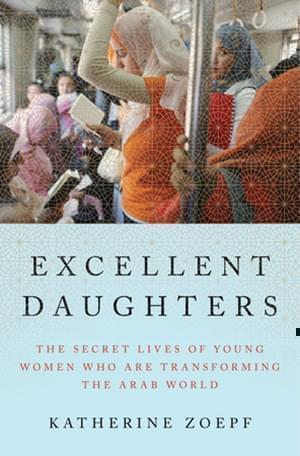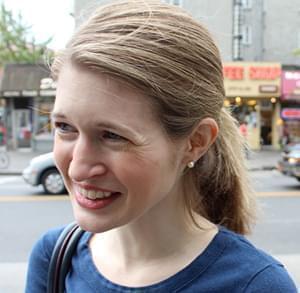‘Excellent Daughters’ Throughout The Middle East Are Transforming Life In Their Countries
Journalist Katherine Zoepf (zohf) covered the Middle East for The New York Times between 2004 and 2010. And she says the reality is much more nuanced than the views of the region commonly held in the US. Illinois Public Media’s Amanda Honigfort talked with Zoepf about the stories shared in her recent book "Excellent Daughters: The Secret Lives of the Young Women Who are Transforming the Arab World."
She continues to cover the region as a fellow at the New America Foundation.

Excellent Daughters tells the stories of sevral women who live throughout the Middle East.
While living and working in the region, Zoepf found a wide diversity of cultures and perspectives that she doesn’t think often come through in coverage of the Middle East.
“I think our news reports on the Middle East are dominated by these stories of war and revolution and terrorism and those stories are very important, but I wanted to make the case that there is diversity, there are things happening in the lives of women in these societies that weren’t being fully seen from oversees and I wanted to share to try to share some of this diversity of views and experiences with readers,” said Zoepf.
In her recent book, Excellent Daughters: The Secret Lives of the Young Women Who are Transforming the Arab World, Zoepf shares the stories of some of the women she met during her time there.
“Daughters making very slightly different decisions than their mother’s made can actually add up in aggregate to really huge changes.”Katherine Zoepf
The women profiled weren’t all looking for more rights for them and their families. One woman, Rowdha Yousef, lead a campaign in Saudi Arabia called “My Guardian Knows What’s Best For Me.”
“Under King Abdullah, who died last January, women’s rights had been more of a priority,” said Zoepf. “Rowdha was one of many Saudi Women, in fact, who felt that things had maybe gone too far and was concerned that Saudi women might lose these guardians who they viewed as protection.”
Zoepf says that she is often asked if the reason many women don’t complain is because they are afraid or brainwashed. She says doesn’t believe that’s the case. Rather, Zoepf says she’s come to believe many women living in Middle Eastern, primarily Islamic, countries are very devout and believe that change is to be found within their religion.

Katherine Zoepf
“I found that very, very interesting because I think most of us would look at a society where a woman’s word in court means half that of a man’s and think ‘well gosh, you’ve gotta toss that all out and replace it before you can really talk seriously about reform’ but many of the women I met would disagree.”
Still, Rowdha Yousef and those who agree with her do not make up the sum of the women Zoepf met during her six years covering the Middle East. There were women who would make up the first graduating class of women lawyers – even though practicing was still forbidden.
Zoepf says she believes many of the women graduating from law school in the first few years didn’t find work within the legal system and ended up working in different professions. She expects many, if not all, of those women she talked to are not amoung the few practicing law.
I think most of us would look at a society where a woman’s word in court means half that of a man’s and think ‘well gosh, you’ve gotta toss that all out and replace it before you can really talk seriously about reform’ but many of the women I met would disagree.Katherine Zoepf
“There are still relatively few [practicing female lawyers in Saudi Arabia]. There are only 67 of them now in a country of 27 million but some of them are doing really amazing things,” said Zoepf
Also amoung the stories Zoepf tells is that of Zahra al-Azzo, a fifteen-year old Syrian who became the victim of an honor killing after being kidnapped and raped. Her case was discussed widely throughout the country for months afterward.
“This set of circumstances – that she was this young, that the family got her released [from a women’s prison protecting her], did in fact get her married, but used the marriage as a pretext to get her out so they could kill her – really offended people.”
Zoepf says she hasn’t had a chance to study honor killings closely since, but anecdotally it seems al-Azzo’s story has not changed much. In fact, Zoepf says, the current upheavals in several countries may in fact be making the practice more common.
Zoepf says this may be the case “because, men maybe who are refugees, who have lost everything they had in a war, feel less in control of their own lives, and one way of sort of asserting your status, or your manhood or your values is by asserting your control over the women in your family.”
Zoepf covers women and girls from many countries and many perspectives. She says that she was inspired to write the book when she came to see that even though this is a part of the world where crises, wars and political upheavals dominated the headlines, “change also takes place in very small ways that may not be noticed at first, and though these regions look a bit static from afar … there’s actually a lot of change and a lot of progress going on,” said Zoepf. “If there was one point I hoped to make in the book it was to emphasize these small gestures.”
“Daughters making very slightly different decisions than their mother’s made can actually add up in aggregate to really huge changes,” said Zoepf.

